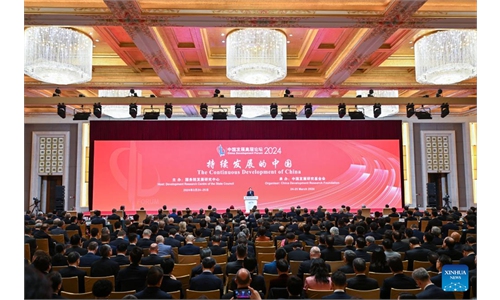
A view of the Lujiazui area in Shanghai Photo: VCG
A well-calibrated fiscal and monetary policy combination, being crafted and orchestrated by Chinese government, will help resolve the intrinsic problems hidden in China's economy. An aggressive fiscal stimulus, coupled with proactive while prudent monetary policy, is generally thought to provide the economy with sustainable energy, shepherding it to grow by around 5 percent in 2024.Independent economists of many international organizations give high marks for Chinese economic policymakers' learning and wit in blending the monetary and fiscal policies in the past four decades to shore up rapid economic growth, and at the same time successfully resisted the cyclical pressures of inflation and deflation.
Entering 2024, China's economy has to overcome the "scar effect" left by the COVID pandemic, including a relatively lackluster domestic consumption and a churning real estate market. Amid the lingering concern about another public health upheaval, the people now tend to snap shut their pocketbooks, and the millennials and generation Z are increasingly hesitant to raise children.
Under these circumstances, the traditional days of steadily growing consumer prices are gone, as China witnessed several months of negative CPI growths in the second half of 2023. To deal with the deflationary pressure, China's central bank moved to reduce the bellwether loan prime rates (LPR) of both one-year and five-year lengths. Last month, the central bank went aggressive, cutting the five-year LPR by a full quarter percentage, which also has the effect of ramping up the country's humdrum housing sales as mortgage rates are slashed too.
Meanwhile, the policy-makers decided to introduce proactive fiscal stimulus measures to fuel up public spending and economic growth.
In 2024 alone, at least 4.9 trillion yuan of central and provincial government bonds will be sold, with the proceeds to be channeled to building up important public infrastructure projects and fostering new quality productive forces to meet China's massive market demand for home-grown advanced semiconductor chips, newest AI and algorithm innovations, nationwide 5.5-G mobile network coverage and highly efficient digital business platforms - able to catapult China's economy to new heights of growth before 2050.
China is determined to "choose transition from high rates to high-quality of growth," said International Monetary Fund Managing Director Kristalina Georgieva at the just concluded China Development Forum held in Beijing. In her speech to the event, she remarked that China has entered a new era of economic growth, and the country will continue to be a key driver of and a contributor to global economic growth in the coming years.
And, renowned US economist Nicholas Lardy, senior fellow at the Peterson Institute for International Economics and a former senior fellow at the Brookings Institution, told Chinese media that it is unwarranted for many media pundits in the West to disseminate the narrative that "China's economy is collapsing" and faces a catastrophic outcome. Instead the economy is recovering, and last year's 5.2 percent GDP growth "is impressive" among major economies.
For a long time, one of the important reasons why the Chinese economy has been able to scale new heights constantly by overcoming domestic difficulties and withstanding external headwinds is its deep understanding of economic laws, and the decision makers' creative ways to exploring new and potent growth drivers, as well as the country's firm determination to implement systemic restructuring, such as the country's unswerving focus on developing clean renewable energies and battery-powered electric trucks and cars.
Georgieva thought highly of China's green development. She described China as a global leader in deploying renewable energy with enormous potential, adding that China was making rapid progress in green mobility. China's remarkable development success has delivered tremendous benefits to hundreds of millions of people in the world, she said.
Georgieva said that China's high-quality development still has a bearing to deepening marketed-regulated reforms and giving priority to private sector growth. Deep structural reforms can enhance the conditions for entrepreneurship, innovation and economic performance. For example, a boost to government finances at the macro level could allow some tailored micro changes in taxation policies on businesses to foster fast growth of new enterprises, aligned with the central bank's monetary policy to increase liquidity through reserve ratio reductions and interest rate cuts.
And, ramped-up government spending is a key component of aggregate demand that can be strategically important for economic development. China's central government has announced the issuance of new ultra-long special treasury bonds in each of the following several years to focus on funding major national projects. No matter it is the development of industrial parks, transportation hubs, public services and highly educated and skilled Chinese work force, government spending is indispensable to underpin the growth of future strategic industrial lines.
The drivers of demand include household consumption of goods and services, private investment, government investment and net exports. As to augmenting China's domestic consumption - a pivotal part of economic growth, the government has pledged to implement a national drive to provide incentives to encourage trade-in of old household appliances, cars and furniture with new models. The replacement of old automobiles, inefficient in fossil fuel use and polluting the air, with Chinese brand-new electric vehicles will also significantly help improve China's urban environment. And, Chinese local authorities are encouraging citizens to have more family outings and leisure time to increase cultural and tourism spending.
Regarding foreign trade, despite the headwinds of geopolitical tensions which are affecting trade and capital flows, China saw a robust take-off of foreign trade in the first two months this year, largely thanks to the high-quality and low-price of made-in-China goods, like heavy machinery, home appliances, electric cars and a wide variety of electronic devices. In 2024, China's total exports of goods will likely grow by 6-8 percent over 2023. Investment, domestic spending and export will guarantee the economy to expand by around 5 percent this year.
IMF head Georgieva said she is confident that China and the world can tackle the challenges this globe is now facing and they can always cooperate to create a more prosperous future in this century.
The author is an editor with the Global Times. bizopinion@globaltimes.com.cn


